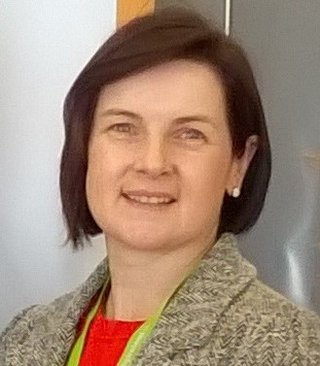
For International Women’s Day 2024, Lynn Swinburne tells us about her role as senior health promotion officer with the National Screening Service, how inclusion is a priority in her daily work and what inspires her to be inclusive.
Lynn Swinburne has been working in health promotion for 21 years – working first in youth health before joining the National Screening Service (NSS).
Lynn explains that health promotion work operates under a set of competencies, a set of ethical practices – respect for the rights, dignity, confidentiality and worth of individuals and groups; addressing health inequities and social injustice; and prioritising the needs of those experiencing poverty and social marginalisation.
So, what does a day in the life of a senior health promotion officer with the NSS look like?
“Every day is different” Lynn says. “I could be lecturing to undergrad health students about screening, or on the phone to a disabled person as access officer for BowelScreen providing support and enabling access for that person.” Lynn’s work also involves planning equity projects and there’s a lot of stakeholder engagement - providing updates on screening and attending various network meetings such as the social inclusion public health forum.
Lynn has learned a lot about inclusion through her work and through working with others.
“For me I have learned that we need to listen more to people, to communities and those with lived experience. We can never truly understand what it’s like to be a part of an underserved community if we have not had that experience ourselves. We need to have empathy and to value the importance of listening and learning.
“I remember working with a group of women to support them to access breast screening. One woman told me about having no electricity and that when she sorted that out, she would think about a mammogram. Another woman talked about the anti-social behaviour in her community and the influence that had on her and her life. Coming to screening was not a priority for these women and I had to understand that with a view to returning to them in the future and supporting them.”
Reflecting on that experience, Lynn says “I’m extremely uncomfortable with the fact that where you are born, or your circumstances of life, mean that you will live a shorter life than others and some of that life will be spent in poor health. It’s wrong and avoidable.”
Lynn says inclusion will always be what we need to prioritise. “Meaningful inclusion is about people representing their own communities in their own words, and us listening and truly understanding what that means. It’s about understanding those experiences and responding accordingly. It’s about understanding inequity and knowing how we can start to address that. It’s about having a culture where inclusion is the way we do our business - it’s the everyday.”
Inclusion groups are very often the ones who need services and support the most but get the least in terms of healthcare, Lynn says. “For me this is where the work needs to be done, supporting people to prioritise preventative healthcare will never be possible as long as they are challenged by the tasks of daily living and the differences we see between social groups. When priorities are about survival, food, security, employment and education, preventive healthcare including screening falls down the list. The social determinants of health are real and present in the communities we work with.”
Taking the conversation back to International Women’s Day and the theme of inspiring inclusion, Lynn talks about some of the women who have inspired her and where she looks for inspiration.
“I often think about Savita Halappanavar and what she had to go through and pay the ultimate sacrifice for. I think about Henrietta Lacks and the use of her cells without her knowledge to advance our understanding of cervical cancer. I think about Mary McGee who took a case against the Attorney General to fight to get access to contraception as she had a condition that her life would be in danger if she became pregnant again.
“I think about the women who every day challenge systems that create inequity for women, unequal pay, the right to education and healthcare all over the world. The mothers who fight for their children and their families.
“I look for inspiration in the stories I hear in communities, of hope, of empowerment, of community spirit. In the UK an organisation called the New Local is reimagining communities and how they can be the solution to their own health challenges. That really speaks to me. Co-design with communities is where it’s at.”
Working with communities has opened Lynn’s eyes to how inequity influences people, their lives, and their choices. “Hopefully” Lynn says, “it inspires many of us to keep working in those communities and offer ongoing support.”
- Read Part 2 – Kathryn Meade tells us how staying connected to the needs of our communities inspires her to be inclusive.